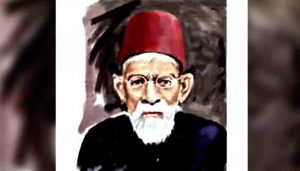We begin 2022 with a look at two articles about public anger; the first over the renaming of a famous poet, the second lines edited out of an ancient poem that forms part of a university course.
Social Media Backlash to Renaming of Famous Poet
 There has been an angry response all over the internet to the decision that has been made by the Indian government to rename Akbar Allahabadi, the famous Muslim poet to Akbar Prayagraj.
There has been an angry response all over the internet to the decision that has been made by the Indian government to rename Akbar Allahabadi, the famous Muslim poet to Akbar Prayagraj.
The ruling has been made by the Higher Education Services Commission in Uttar Pradesh. They are the autonomous body under which the state is governed.
The district of Allahabad, for which the poet was named, was renamed as the Prayagraj district in 2018 by the extremist government of Yogi Adityanath. It have been known as Allahabad for 443 years. Akbar Allahabadi is the popular name of the Urdu poet whose real name is Syed Akhbar Hussain, however on the “About Allahabad” website for the are is has now been updated to Akbar Prayagraj.
His is not the only name to have been changed, any poet or writer who was using “Allahabadi” as a suffix for their name has now had it changed to “Prayagraj.” The Uttar Pradesh Education Minister and Chief Minister has responded to the uproar to state that they were unaware of the changes and would need to check with the department who had made the change.
Akbar Allahabadi died in February 1921.
Ancient Poem on University Syllabus Edited Over Domestic Violence Fear
 Reading University has been forced to defend its action over a lecture handout that it has edited. The History Reclaimed campaign group believes that its actions constitute a “liberal emphasis on emotional wellbeing”
Reading University has been forced to defend its action over a lecture handout that it has edited. The History Reclaimed campaign group believes that its actions constitute a “liberal emphasis on emotional wellbeing”
The poem in question is an Ancient Greek one and the lines that have been edited out in the handout have been removed over a fear that they could “trigger” students due to references to domestic violence. The poem which was written by Semonides of Amorgos is called “Types of Women,” sometimes referred to simply as “Women”. The course is part of an introductory module for freshers and is part of “Greek History: war, society and change in the Archaic Age.” The content of the poem was previously covered by a verbal trigger warning.However, a decision was made to drop the offending lines completely from the poem.
There were no complaints from students that triggered the decision. However, officials at the university felt that the poem in its full and original form may offer new students a distorted view of the classics. Concerns have now been raised by leading scholars over how such a mood could narrow the range of free though over historical events that students may learn to display.
This is a piece written in the seventh century BC. It is 118 lines in length and describes what it referes to as the ten types of women that Zeus created. Based on models offered by the natural world these are seven which are animals, two which are named for the element – all nine of these are shown as destructive women. The tenth is inspired by a bee and represents a good wife. However it is some of the lines that describe this final type that also make references to violence and force.
The university also has “content warnings” over some of the artwork that it looks at that covers an Egyptian battle between Tutankhamun and Ramesses II.


You must register to comment. Log in or Register.